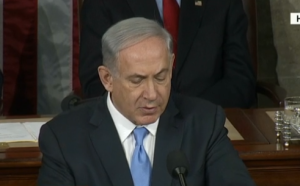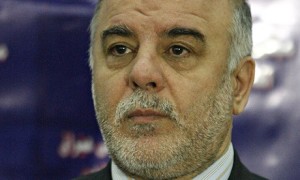The Reasons for Netanyahu's Panic
Israeli Prime Minister Netanyahu is pushing the panic button over the collapse of the Saudi-Israeli jihadist proxies in Syria and now threatening to launch a major air war, as ex-British diplomat Alastair Crooke describes.
By Alastair Crooke
A very senior Israeli intelligence delegation, a week ago, visited Washington. Then, Israeli Prime Minister Benjamin Netanyahu broke into President Putin’s summer holiday to meet him in Sochi, where, according to a senior Israeli government official (as cited in the Jerusalem Post), Netanyahu threatened to bomb the Presidential Palace in Damascus, and to disrupt and nullify the Astana cease-fire process, should Iran continue to “extend its reach in Syria.”

Israeli Prime Minister Benjamin Netanyahu speaking to a joint session of the U.S. Congress on March 3, 2015, in opposition to President Barack Obama’s nuclear agreement with Iran. (Screen shot from CNN broadcast)
Russia’s Pravda wrote, “according to eyewitnesses of the open part of the talks, the Israeli prime minister was too emotional and at times even close to panic. He described a picture of the apocalypse to the Russian president that the world may see, if no efforts are taken to contain Iran, which, as Netanyahu believes, is determined to destroy Israel.”
So, what is going on here? Whether or not Pravda’s quote is fully accurate (though the description was confirmed by senior Israeli commentators), what is absolutely clear (from Israeli sources) is that both in Washington and at Sochi, the Israeli officials were heard out, but got nothing. Israel stands alone. Indeed, it is reported that Netanyahu was seeking “guarantees” about the future Iranian role in Syria, rather than “asking for the moon” of an Iranian exit. But how could Washington or Moscow realistically give Israel such guarantees?
Belatedly, Israel has understood that it backed the wrong side in Syria – and it has lost. It is not really in a position to demand anything. It will not get an American enforced buffer zone beyond the Golan armistice line, nor will the Iraqi-Syrian border be closed, or somehow “supervised” on Israel’s behalf.
Of course, the Syrian aspect is important, but to focus only on that, would be to “miss the forest for the trees.” The 2006 war by Israel to destroy Hizbullah (egged on by the U.S., Saudi Arabia – and even a few Lebanese) was a failure. Symbolically, for the first time in the Middle East, a technologically sophisticated, and lavishly armed, Western nation-state simply failed. What made the failure all the more striking (and painful) was that a Western state was not just bested militarily, it had lost also the electronic and human intelligence war, too — both spheres in which the West thought their primacy unassailable.
The Fallout from Failure
Israel’s unexpected failure was deeply feared in the West, and in the Gulf too. A small, armed (revolutionary) movement had stood up to Israel – against overwhelming odds – and prevailed: it had stood its ground. This precedent was widely perceived to be a potential regional “game changer.” The feudal Gulf autocracies sensed in Hizbullah’s achievement the latent danger to their own rule from such armed resistance.

Syrian President Bashar al-Assad.
The reaction was immediate. Hizbullah was quarantined — as best the full sanctioning powers of America could manage. And the war in Syria started to be mooted as the “corrective strategy” to the 2006 failure (as early as 2007) — though it was only with the events following 2011 that the “corrective strategy” came to implemented, à outrance.
Against Hizbullah, Israel had thrown its full military force (though Israelis always say, now, that they could have done more). And against Syria, the U.S., Europe, the Gulf States (and Israel in the background) have thrown the kitchen sink: jihadists, al-Qaeda, ISIS (yes), weapons, bribes, sanctions and the most overwhelming information war yet witnessed. Yet Syria – with indisputable help from its allies – seems about to prevail: it has stood its ground, against almost unbelievable odds.
Just to be clear: if 2006 marked a key point of inflection, Syria’s “standing its ground” represents a historic turning of much greater magnitude. It should be understood that Saudi Arabia’s (and Britain’s and America’s) tool of fired-up, radical Sunnism has been routed. And with it, the Gulf States, but particularly Saudi Arabia are damaged. The latter has relied on the force of Wahabbism since the first foundation of the kingdom: but Wahabbism in Lebanon, Syria and Iraq has been roundly defeated and discredited (even for most Sunni Muslims). It may well be defeated in Yemen too. This defeat will change the face of Sunni Islam.
Already, we see the Gulf Cooperation Council, which originally was founded in 1981 by six Gulf tribal leaders for the sole purpose of preserving their hereditary tribal rule in the Peninsula, now warring with each other, in what is likely to be a protracted and bitter internal fight. The “Arab system,” the prolongation of the old Ottoman structures by the complaisant post-World War I victors, Britain and France, seems to be out of its 2013 “remission” (bolstered by the coup in Egypt), and to have resumed its long-term decline.
The Losing Side
Netayahu’s “near panic” (if that is indeed what occurred) may well be a reflection of this seismic shift taking place in the region. Israel has long backed the losing side – and now finds itself “alone” and fearing for its near proxies (the Jordanians and the Kurds). The “new” corrective strategy from Tel Aviv, it appears, is to focus on winning Iraq away from Iran, and embedding it into the Israel-U.S.-Saudi alliance.

President Donald Trump touches lighted globe with Egyptian President Abdel Fattah al-Sisi and Saudi King Salman and Donald Trump at the opening of Saudi Arabia’s Global Center for Combating Extremist Ideology on May 21, 2017. (Photo from Saudi TV)
If so, Israel and Saudi Arabia are probably too late into the game, and are likely underestimating the visceral hatred engendered among so many Iraqis of all segments of society for the murderous actions of ISIS. Not many believe the improbable (Western) narrative that ISIS suddenly emerged armed, and fully financed, as a result of former Iraqi Prime Minister Nouri al-Maliki’s alleged “sectarianism”: No, as rule-of-thumb, behind each such well-breached movement – stands a state.
Daniel Levy has written a compelling piece to argue that Israelis generally would not subscribe to what I have written above, but rather: “Netanyahu’s lengthy term in office, multiple electoral successes, and ability to hold together a governing coalition … [is based on] him having a message that resonates with a broader public. It is a sales pitch that Netanyahu … [has] ‘brought the state of Israel to the best situation in its history, a rising global force … the state of Israel is diplomatically flourishing.’ Netanyahu had beaten back what he had called the ‘fake-news claim’ that without a deal with the Palestinians ‘Israel will be isolated, weakened and abandoned’ facing a ‘diplomatic tsunami.’
“Difficult though it is for his political detractors to acknowledge, Netanyahu’s claim resonates with the public because it reflects something that is real, and that has shifted the center of gravity of Israeli politics further and further to the right. It is a claim that, if correct and replicable over time, will leave a legacy that lasts well beyond Netanyahu’s premiership and any indictment he might face.
“Netanyahu’s assertion is that he is not merely buying time in Israel’s conflict with the Palestinians to improve the terms of an eventual and inevitable compromise. Netanyahu is laying claim to something different — the possibility of ultimate victory, the permanent and definitive defeat of the Palestinians, their national and collective goals.
“In over a decade as prime minister, Netanyahu has consistently and unequivocally rejected any plans or practical steps that even begin to address Palestinian aspirations. Netanyahu is all about perpetuating and exacerbating the conflict, not about managing it, let alone resolving it…[The] message is clear: there will be no Palestinian state because the West Bank and East Jerusalem are simply Greater Israel.”
Israeli Prime Minister Netanyahu is pushing the panic button over the collapse of the Saudi-Israeli jihadist proxies in Syria and now threatening to launch a major air war, as ex-British diplomat Alastair Crooke describes.
By Alastair Crooke
A very senior Israeli intelligence delegation, a week ago, visited Washington. Then, Israeli Prime Minister Benjamin Netanyahu broke into President Putin’s summer holiday to meet him in Sochi, where, according to a senior Israeli government official (as cited in the Jerusalem Post), Netanyahu threatened to bomb the Presidential Palace in Damascus, and to disrupt and nullify the Astana cease-fire process, should Iran continue to “extend its reach in Syria.”

Israeli Prime Minister Benjamin Netanyahu speaking to a joint session of the U.S. Congress on March 3, 2015, in opposition to President Barack Obama’s nuclear agreement with Iran. (Screen shot from CNN broadcast)
Russia’s Pravda wrote, “according to eyewitnesses of the open part of the talks, the Israeli prime minister was too emotional and at times even close to panic. He described a picture of the apocalypse to the Russian president that the world may see, if no efforts are taken to contain Iran, which, as Netanyahu believes, is determined to destroy Israel.”
So, what is going on here? Whether or not Pravda’s quote is fully accurate (though the description was confirmed by senior Israeli commentators), what is absolutely clear (from Israeli sources) is that both in Washington and at Sochi, the Israeli officials were heard out, but got nothing. Israel stands alone. Indeed, it is reported that Netanyahu was seeking “guarantees” about the future Iranian role in Syria, rather than “asking for the moon” of an Iranian exit. But how could Washington or Moscow realistically give Israel such guarantees?
Belatedly, Israel has understood that it backed the wrong side in Syria – and it has lost. It is not really in a position to demand anything. It will not get an American enforced buffer zone beyond the Golan armistice line, nor will the Iraqi-Syrian border be closed, or somehow “supervised” on Israel’s behalf.
Of course, the Syrian aspect is important, but to focus only on that, would be to “miss the forest for the trees.” The 2006 war by Israel to destroy Hizbullah (egged on by the U.S., Saudi Arabia – and even a few Lebanese) was a failure. Symbolically, for the first time in the Middle East, a technologically sophisticated, and lavishly armed, Western nation-state simply failed. What made the failure all the more striking (and painful) was that a Western state was not just bested militarily, it had lost also the electronic and human intelligence war, too — both spheres in which the West thought their primacy unassailable.
The Fallout from Failure
Israel’s unexpected failure was deeply feared in the West, and in the Gulf too. A small, armed (revolutionary) movement had stood up to Israel – against overwhelming odds – and prevailed: it had stood its ground. This precedent was widely perceived to be a potential regional “game changer.” The feudal Gulf autocracies sensed in Hizbullah’s achievement the latent danger to their own rule from such armed resistance.

Syrian President Bashar al-Assad.
The reaction was immediate. Hizbullah was quarantined — as best the full sanctioning powers of America could manage. And the war in Syria started to be mooted as the “corrective strategy” to the 2006 failure (as early as 2007) — though it was only with the events following 2011 that the “corrective strategy” came to implemented, à outrance.
Against Hizbullah, Israel had thrown its full military force (though Israelis always say, now, that they could have done more). And against Syria, the U.S., Europe, the Gulf States (and Israel in the background) have thrown the kitchen sink: jihadists, al-Qaeda, ISIS (yes), weapons, bribes, sanctions and the most overwhelming information war yet witnessed. Yet Syria – with indisputable help from its allies – seems about to prevail: it has stood its ground, against almost unbelievable odds.
Just to be clear: if 2006 marked a key point of inflection, Syria’s “standing its ground” represents a historic turning of much greater magnitude. It should be understood that Saudi Arabia’s (and Britain’s and America’s) tool of fired-up, radical Sunnism has been routed. And with it, the Gulf States, but particularly Saudi Arabia are damaged. The latter has relied on the force of Wahabbism since the first foundation of the kingdom: but Wahabbism in Lebanon, Syria and Iraq has been roundly defeated and discredited (even for most Sunni Muslims). It may well be defeated in Yemen too. This defeat will change the face of Sunni Islam.
Already, we see the Gulf Cooperation Council, which originally was founded in 1981 by six Gulf tribal leaders for the sole purpose of preserving their hereditary tribal rule in the Peninsula, now warring with each other, in what is likely to be a protracted and bitter internal fight. The “Arab system,” the prolongation of the old Ottoman structures by the complaisant post-World War I victors, Britain and France, seems to be out of its 2013 “remission” (bolstered by the coup in Egypt), and to have resumed its long-term decline.
The Losing Side
Netayahu’s “near panic” (if that is indeed what occurred) may well be a reflection of this seismic shift taking place in the region. Israel has long backed the losing side – and now finds itself “alone” and fearing for its near proxies (the Jordanians and the Kurds). The “new” corrective strategy from Tel Aviv, it appears, is to focus on winning Iraq away from Iran, and embedding it into the Israel-U.S.-Saudi alliance.

President Donald Trump touches lighted globe with Egyptian President Abdel Fattah al-Sisi and Saudi King Salman and Donald Trump at the opening of Saudi Arabia’s Global Center for Combating Extremist Ideology on May 21, 2017. (Photo from Saudi TV)
If so, Israel and Saudi Arabia are probably too late into the game, and are likely underestimating the visceral hatred engendered among so many Iraqis of all segments of society for the murderous actions of ISIS. Not many believe the improbable (Western) narrative that ISIS suddenly emerged armed, and fully financed, as a result of former Iraqi Prime Minister Nouri al-Maliki’s alleged “sectarianism”: No, as rule-of-thumb, behind each such well-breached movement – stands a state.
Daniel Levy has written a compelling piece to argue that Israelis generally would not subscribe to what I have written above, but rather: “Netanyahu’s lengthy term in office, multiple electoral successes, and ability to hold together a governing coalition … [is based on] him having a message that resonates with a broader public. It is a sales pitch that Netanyahu … [has] ‘brought the state of Israel to the best situation in its history, a rising global force … the state of Israel is diplomatically flourishing.’ Netanyahu had beaten back what he had called the ‘fake-news claim’ that without a deal with the Palestinians ‘Israel will be isolated, weakened and abandoned’ facing a ‘diplomatic tsunami.’
“Difficult though it is for his political detractors to acknowledge, Netanyahu’s claim resonates with the public because it reflects something that is real, and that has shifted the center of gravity of Israeli politics further and further to the right. It is a claim that, if correct and replicable over time, will leave a legacy that lasts well beyond Netanyahu’s premiership and any indictment he might face.
“Netanyahu’s assertion is that he is not merely buying time in Israel’s conflict with the Palestinians to improve the terms of an eventual and inevitable compromise. Netanyahu is laying claim to something different — the possibility of ultimate victory, the permanent and definitive defeat of the Palestinians, their national and collective goals.
“In over a decade as prime minister, Netanyahu has consistently and unequivocally rejected any plans or practical steps that even begin to address Palestinian aspirations. Netanyahu is all about perpetuating and exacerbating the conflict, not about managing it, let alone resolving it…[The] message is clear: there will be no Palestinian state because the West Bank and East Jerusalem are simply Greater Israel.”







